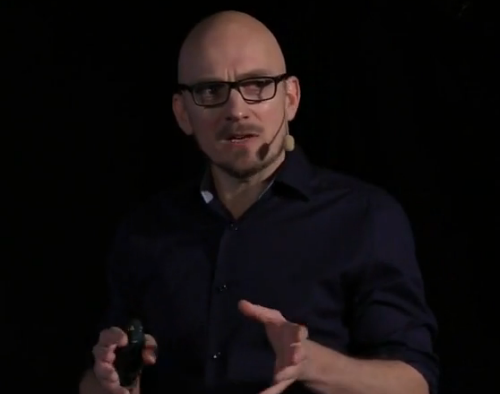(单词翻译:单击)
听力文本
And what happens then when they are asked to motivate their choices?
当他们被问及为什么会选择这个答案时,会发生什么事呢?
And here we find much more interesting verbal reports than compared to the faces.
在这里,我们发现了比起面部测试更有趣的口头报告。
People say things like this, and I'll read it to you.
人们这样说,我读给你们听。
So, "Large-scale governmental surveillance of email and internet traffic ought to be permissible as means to combat international crime and terrorism."
他们说:“政府大规模针对电子邮件和网络系统的监管应当是被允许的,这意味着可以打击国际犯罪和恐怖组织。”
"So you agree to some extent with this statement." "Yes."
“那么在一定程度上你是同意这一陈述的。”“是的”。
"So how did you reason here?"
“那么,这里你给的理由是什么?”
"Well, like, as it is so hard to get at international crime and terrorism, I think there should be those kinds of tools."
“嗯,鉴于打击国际犯罪和恐怖主义是非常困难的,我想那应该就是可以采用的工具。”
And then the person remembers an argument from the newspaper in the morning.
然后有个人记起早上的报纸上有一段论述。

"Like in the newspaper today, it said they can like,
“就像早上报纸讲的那样,据说,
listen to mobile phones from prison, if a gang leader tries to continue his crimes from inside.
他们能够监听到从狱中打进打出的电话,比如是否有黑帮头目想在狱中继续从事他的犯罪活动。
And I think it's madness that we have so little power that we can't stop those things when we actually have the possibility to do so."
我认为不可思议的是,我们有希望阻止此类事情发生,但是却没有足够的能力做到这一点。”
And then there's a little bit back and forth in the end:
最后还有一段犹豫不决的说辞:
"I don't like that they have access to everything I do, but I still think it's worth it in the long run."
“我不喜欢他们介入到我做的任何事情中,但我还是认为这是长久之计。”
So, if you didn't know that this person just took part in a choice blindness experiment,
如果你不知道这个人刚刚参加了那个盲选实验,
I don't think you would question that this is the true attitude of that person.
我想你不会质疑这就是那个人的真实态度。
And what happens in the end, with the voting intention?
那么最后的投票意向是怎样呢?
What we find -- that one is also clearly affected by the questionnaire.
我们发现,人的思想也明显受到了问卷的影响。
So we have 10 participants shifting from left to right or from right to left.
我们有10个参与者从左翼转到右翼,右翼换到左翼。
We have another 19 that go from clear voting intention to being uncertain.
还有另外19个人的投票意向从明确变到不明确。
Some go from being uncertain to clear voting intention.
有些人的投票意向由不明确转向明确。
And then there is a number of participants staying uncertain throughout.
还有很多参与者从头到尾都不确定。
And that number is interesting because if you look at what the polling institutes say the closer you get to an election,
这个数字很有意思,因为,你若去看民意调查机构的说法,越接近大选时,
the only people that are sort of in play are the ones that are considered uncertain.
还能够受到影响的人,就是那些犹豫不决的人。
But we show there is a much larger number that would actually consider shifting their attitudes.
但是,我们的试验表明有相当一部分人实际上还会考虑转变他们的态度。
演讲介绍
实验心理学家培特·乔纳森对选择盲从性进行了研究——即一种使我们信服我们得到的就是我们想要的现象,甚至是当我们没得到的时候也是如此。在这个使人大开眼界的演讲中, 培特与我们分享了他的一个(与魔术师合作设计的)实验, 目的是回答这个问题:为什么我们会有这样或那样的行为?实验的结果对自我认知的自然属性及我们如何对操控做出反应都产生了重大影响。或许你不像你想的那样认识你自己。


